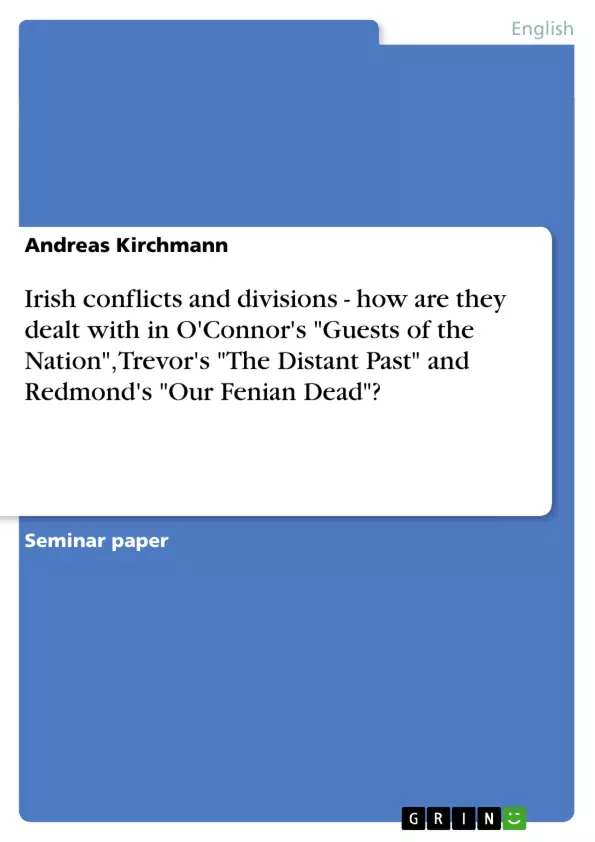Although being a rather small country, Ireland has a long and rich history, which includes many conflicts. One is the conflict with Ireland’s neighbour England and another, related one concerns the relationship between Protestants and Catholics, a relationship which is still tense nowadays.
These conflicts are subject of many short stories by Irish writers, and in this essay I am going to try to find out how these conflicts are dealt with in some of those stories. I have chosen three short stories by different Irish writers, namely “Guests of the Nation” by Frank O’Connor, “The Distant Past” by William Trevor and “Our Fenian Dead” by Lucille Redmond.
I will start by analysing these stories by themselves under the aspect of what the main conflict of the story is and how it is presented. Afterwards, I will compare these results in order to find out if any similarities in dealing with these conflicts exist and whether there are some main aspects or messages, which occur in all of them.
Inhaltsverzeichnis (Table of Contents)
- Introduction
- Analysis of the short stories
- Frank O'Connor “Guests of the Nation”
- William Trevor “The Distant Past”
- Lucille Redmond “Our Fenian Dead”
- Comparison of the short stories
- Conclusion
- List of works cited
Zielsetzung und Themenschwerpunkte (Objectives and Key Themes)
This essay aims to explore how Irish conflicts and divisions are portrayed in three short stories by Irish writers: "Guests of the Nation" by Frank O'Connor, "The Distant Past" by William Trevor, and "Our Fenian Dead" by Lucille Redmond. The essay analyzes each story individually to identify its central conflict and its presentation, then compares the findings to identify common themes and messages across the texts.
- The impact of historical conflicts on individual lives
- The complexities of identity and belonging in a divided society
- The role of friendship and loyalty amidst conflict
- The moral dilemmas faced by individuals during wartime
- The dehumanizing effects of war and politics
Zusammenfassung der Kapitel (Chapter Summaries)
- Introduction: This section provides background information about the historical context of Ireland, highlighting its enduring conflicts with England and the ongoing tension between Protestants and Catholics. It introduces the three short stories that will be analyzed in the essay.
- Analysis of the short stories:
- Frank O'Connor "Guests of the Nation": This chapter focuses on the story "Guests of the Nation," which is set during the Irish Civil War. It explores the complex relationship between Irish and English soldiers, highlighting the unexpected friendships that form despite their differences. The chapter also delves into the moral dilemmas faced by the Irish soldiers as they grapple with their loyalty to their country and their burgeoning friendship with the English prisoners. The chapter analyzes how war can impact human relationships and erode traditional notions of friendship and duty.
- William Trevor "The Distant Past": This chapter provides a summary of the story "The Distant Past," but without revealing any major plot points or spoilers.
- Lucille Redmond "Our Fenian Dead": This chapter provides a summary of the story "Our Fenian Dead," but without revealing any major plot points or spoilers.
- Comparison of the short stories: This section compares the themes and messages of the three stories, highlighting their similarities and differences in their approach to the complex issue of conflict and division in Ireland.
Schlüsselwörter (Keywords)
This essay focuses on the themes of Irish conflict, identity, loyalty, friendship, and the dehumanizing effects of war. It examines the works of Irish writers such as Frank O'Connor, William Trevor, and Lucille Redmond, exploring their perspectives on historical events and their impact on individual lives. Key concepts include the Irish Civil War, the relationship between Ireland and England, and the complexities of belonging in a divided society.
Frequently Asked Questions
Which short stories are analyzed in this essay?
The essay analyzes "Guests of the Nation" by Frank O'Connor, "The Distant Past" by William Trevor, and "Our Fenian Dead" by Lucille Redmond.
What is the central theme of O'Connor's "Guests of the Nation"?
The story explores the conflict between personal friendship and national loyalty during the Irish Civil War, highlighting the dehumanizing effects of war.
What types of conflicts are common in Irish literature according to the text?
Common conflicts include the historical struggle between Ireland and England, as well as the internal divisions between Protestants and Catholics.
How do the authors portray identity in these stories?
Identity is shown as complex and often tied to historical grievances, making belonging difficult in a society divided by politics and religion.
What moral dilemmas are addressed in the essay?
The essay examines the moral choices individuals must make when their personal values and friendships clash with their political duties during times of conflict.
- Citation du texte
- Andreas Kirchmann (Auteur), 2005, Irish conflicts and divisions - how are they dealt with in O'Connor's "Guests of the Nation", Trevor's "The Distant Past" and Redmond's "Our Fenian Dead"?, Munich, GRIN Verlag, https://www.grin.com/document/41424



